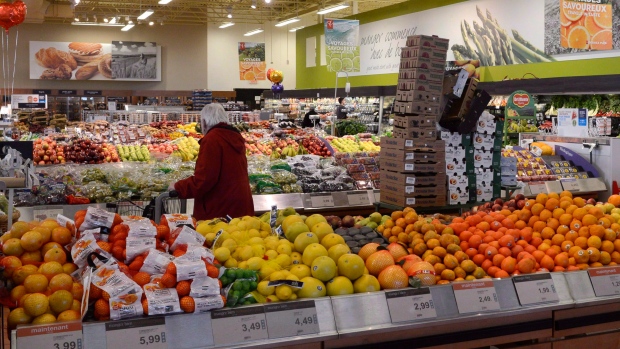Jun 16, 2017
TSX rises as energy outweighs Amazon-battered grocers
, Reuters

Canada's benchmark stock index rose on Friday as energy shares rebounded with oil prices, offsetting losses for consumer staple companies on news that internet retailer Amazon.com Inc was buying Whole Foods Market Inc.
The energy group, which hit its lowest level in 13 months on Thursday, rebounded 0.9 per cent, led by Enbridge Inc, which rose 2.3 per cent to $51.44.
U.S. crude prices settled 28 cents US higher at US$44.74 a barrel as some producers reduced exports and U.S. rig additions slowed.
The Toronto Stock Exchange's S&P/TSX composite index closed up 32.12 points, or 0.21 per cent, at 15,192.54, after four straight days of losses and a day after hitting a six-month low.
Six of the index's 10 main groups ended higher. The heavyweight financials group gained 0.2 per cent and industrials rose 0.4 per cent.
Still, the index closed below its 200-day moving average for a third straight day. For the week, it fell 1.8 per cent.
"We believe that the correction has been in progress for four weeks," said Sid Mokhtari, market technician and director, institutional equity research, CIBC World Markets.
Recent weakening in oil and gold prices has weighed on the index, which is very "resource-orientated" and could fall another four per cent before finding a floor, Mokhtari said.
The Canadian consumer staples sector tumbled as much as 3.4 per cent in its sharpest fall since October 2008 before paring losses to 1.4 per cent, after Amazon made deeper inroads into the grocery sector with its deal to buy Whole Foods.
Loblaw Companies Ltd, which has more than 2,300 corporate, franchised and associate-owned grocery stores and pharmacies across Canada, ended down 3.6 per cent at $72.79, after falling as much as 5.8 per cent.
Empire Company Ltd, which has about 1,500 Canadian stores operating under banners including Sobeys and FreshCo, fell 3.6 per cent to $18.74. Metro Inc, which operates some 600 supermarkets in Quebec and Ontario, fell 2.9 per cent to $43.16.
Consumer discretionary shares also retreated, declining 1.0 per cent, with Magna International Inc taking a 4.6 per cent hit to trade at $57.30.
The materials group, which includes precious and base metals miners and fertilizer companies, lost 0.5 per cent.
Teck Resources Ltd fell 8.6 per cent to $19.73, extending losses from Thursday after the miner said it was lowering its forecast of the average realized price for its steelmaking coal in the second quarter. Several analysts cut its target price on the news.
U.S. MARKETS
Major U.S. stock indexes ended little changed on Friday even as Amazon.com's US$13.7 billion deal to buy upscale grocer Whole Foods roiled the retail sector and rocked shares of an array of companies including Wal-Mart and Target.
Energy sector shares helped buoy the S&P 500 and the Dow industrials, while Apple dragged on the Nasdaq.
The deal by Amazon, a proven retail disruptor, marked a major step by the internet retailer into the brick-and-mortar retail sector.
Wal-Mart shares sank 4.7 per cent, weighing the most on the Dow. Shares of Target, Walgreen Boots and Costco fell between five per cent and seven per cent.
"It's going to send a shock wave across the board, and this represents the true utmost in market disruption," said Burns McKinney, chief investment officer with the Dallas investment team for Allianz Global Investors.
"There's big winners and big losers."
Amazon shares gained 2.4 per cent, making the stock the biggest boost to the S&P 500. Whole Foods shares surged 29.1 per cent.
The S&P consumer staples sector fell one per cent, by far the worst performing major sector. The S&P 500 food and staples retailing index dropped 4.2 per cent.
Grocery chain Kroger was the biggest loser on the S&P 500, falling 9.2 per cent, while Supervalu dropped 14.4 per cent.
"I would not like to be somebody playing in the grocery space right now," said Jan Rogers Kniffen, chief executive of retail consultancy firm J. Rogers Kniffen WWE in New York.
The Dow Jones Industrial Average rose 24.38 points, or 0.11 per cent, to end at 21,384.28, the S&P 500 gained 0.69 point, or 0.03 per cent, to 2,433.15 and the Nasdaq Composite dropped 13.74 points, or 0.22 per cent, to 6,151.76.
The technology sector fell 0.2 per cent, continuing its recent slump. Apple shares closed down 1.4 per cent.
Tech has led the S&P 500's 8.7 per cent rally this year, but posted its second week of declines, prompting questions over whether investors are moving money into other sectors.
"I think we need to see more of a pullback to say there is a serious rotation going on as opposed to just some profits coming off the top," said Chuck Carlson, chief executive officer at Horizon Investment Services in Hammond, Indiana.
Energy shares rose 1.7 per cent, propping up the S&P 500. Oil prices bounced off the year's lows as some producers reduced exports and U.S. rig additions slowed.
U.S. homebuilding fell for a third straight month in May to the lowest in eight months as construction activity declined broadly. Investors were continuing to digest the Federal Reserve's interest rate hike on Wednesday, with some concerned about the economy's ability to absorb higher rates.
In other corporate news, Booz Allen Hamilton shares dropped 19 per cent after news of a U.S. Department of Justice investigation.
Advancing issues outnumbered declining ones on the NYSE by a 1.36-to-1 ratio; on Nasdaq, a 1.22-to-1 ratio favored decliners.
About 9.7 billion shares changed hands in U.S. exchanges, well above the 6.8 billion daily average over the last 20 sessions.






